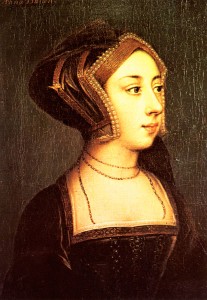 On 10th May 1536, Giles Heron, foreman of the Grand Jury of Middlesex and son-in-law of the late Sir Thomas More, announced that the jury had decided that there was sufficient evidence to suggest that Anne Boleyn, George Boleyn, Mark Smeaton, Sir Henry Norris, Sir Francis Weston and Sir William Brereton were guilty of the alleged crimes carried out at Hampton Court Palace and Whitehall, and that they should be indicted and sent to trial before a jury.
On 10th May 1536, Giles Heron, foreman of the Grand Jury of Middlesex and son-in-law of the late Sir Thomas More, announced that the jury had decided that there was sufficient evidence to suggest that Anne Boleyn, George Boleyn, Mark Smeaton, Sir Henry Norris, Sir Francis Weston and Sir William Brereton were guilty of the alleged crimes carried out at Hampton Court Palace and Whitehall, and that they should be indicted and sent to trial before a jury.
Click here to read the Middlesex indictment listing the charges against Queen Anne and the men.